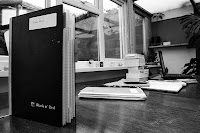
A weekend later and several drafts further down the line I think the script can be submitted. It isn’t finished but I never get to the stage of thinking a piece is beyond further changes.
There is also the problem that I have lost the ability to judge this script. It needs to go in a drawer. After a little time apart we will be able to resolve our issues and focus on the bigger concerns rather than getting bogged down within the small details.
Pass The Parcel is a radio play that I began work on about a year ago. It’s about two sisters who discover their dead father’s porn collection (a father who was very strict and religious - and very much in opposition to porn). The play is an exploration of secrets within families.
The main issues that I still have with it are as follows:-
I’m still not sure about the beginning. I always wanted to start with the opening of the cupboard as a teaser scene then go back into the build of the day before this. But going back in time is confusing in radio unless you are using a technique like narration to clarify. I did draft some pages with the Reverend narrating (he was talking as though to God but then there is a realisation that he was talking to Mair as though she was an angel) but it was dropped in the second draft.
I do struggle with the use of narration as a tool. I hate to use it to clarify or move a script along as that just feels as though I'm not doing my job properly. Though I absolutely love writing it. Inner voices are very effective on radio though and so I have no problem using it as long as it is fundamental to the telling of the story. Incidentally also in that first draft the Reverend was in love with Mair, which I also dropped as a dynamic to explain the Reverend’s actions because I thought it cliche.
The problem with the beginning now is that the play could start with either the teaser scene or equally with the phone conversation that follows, but that worries me. There should simply be a right way to start it and there should be no other way to start this play and make it work.
This play originally started using the discovery of the porn collection to unveil a bigger family secret but in the first draft I found that element becoming a sub-plot. I wanted to understand why this man would have such a significant collection of porn and I found myself exploring that idea more. By the time I reached the end I had written a very different play to the one I began - whilst still using the hidden porn as a metaphor for hidden family secrets. The one thing I keep thinking now is, have a merged the streams of the different stories into one coherent whole or does it have bumpy bits that need more smoothing. Does it make it a more multi layered story? Or is it a piece of wallpaper over a crack of ever-shifting subsidence?
In terms of the structure I still think that maybe the final scene should be split into two scenes. We should be there with the sisters briefly on their drunken escapade around town and then with them the morning after. But I think I have to leave it for now because as I wrote the draft I felt very strongly about the point in the story to which I moved. I will look at this again after a break from it.
In terms of the pitch – the proposal is for another radio play, Fault-lines. I’ve outlined the story and feel that it is strong idea with a very strong start but if I’m honest I wish I had longer to work through the idea to form the style of the play more, but I’m out of time and have to hope that the core of the story is reflected in the pitch.
Finally I have to add some information about myself onto the application form, I have to tell them about me, what I like and what I like to write. Now this part of the submission is the thing I find most difficult. Summing me up in a few words. Nightmare!




